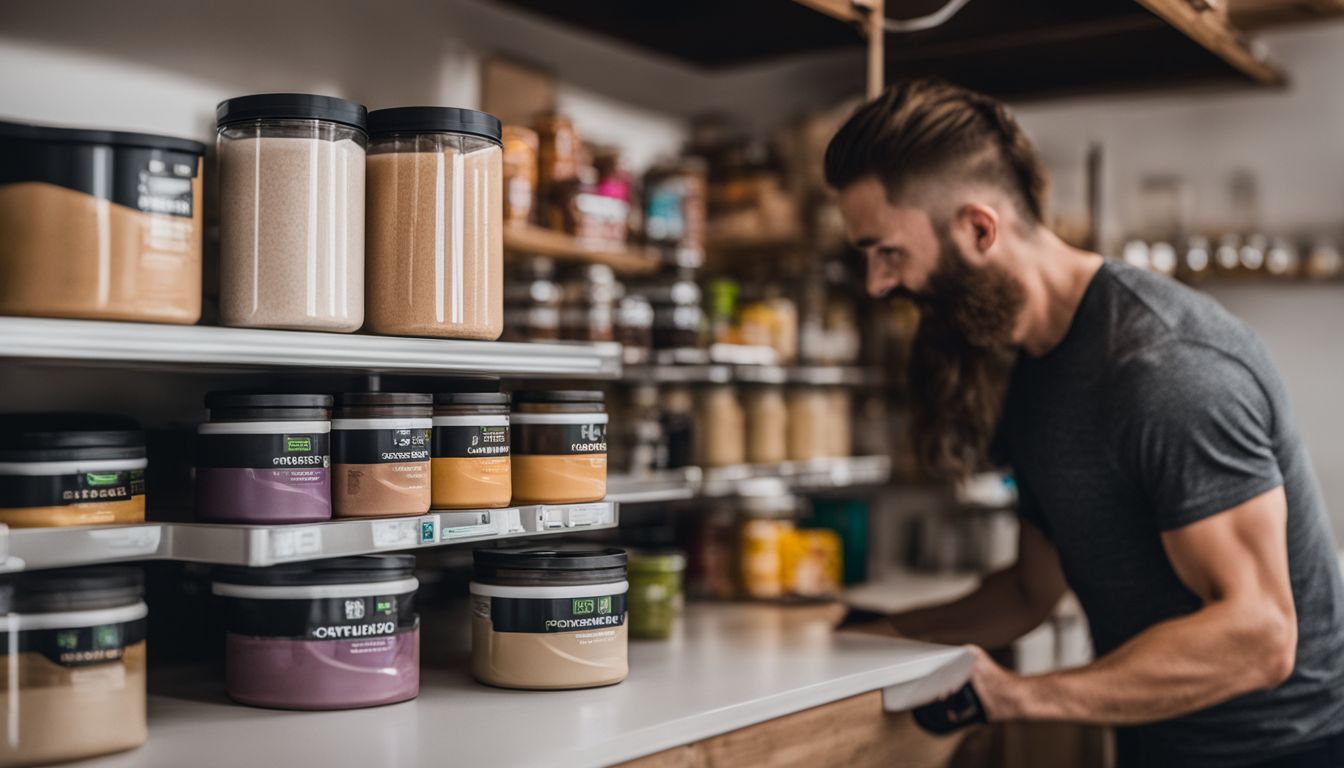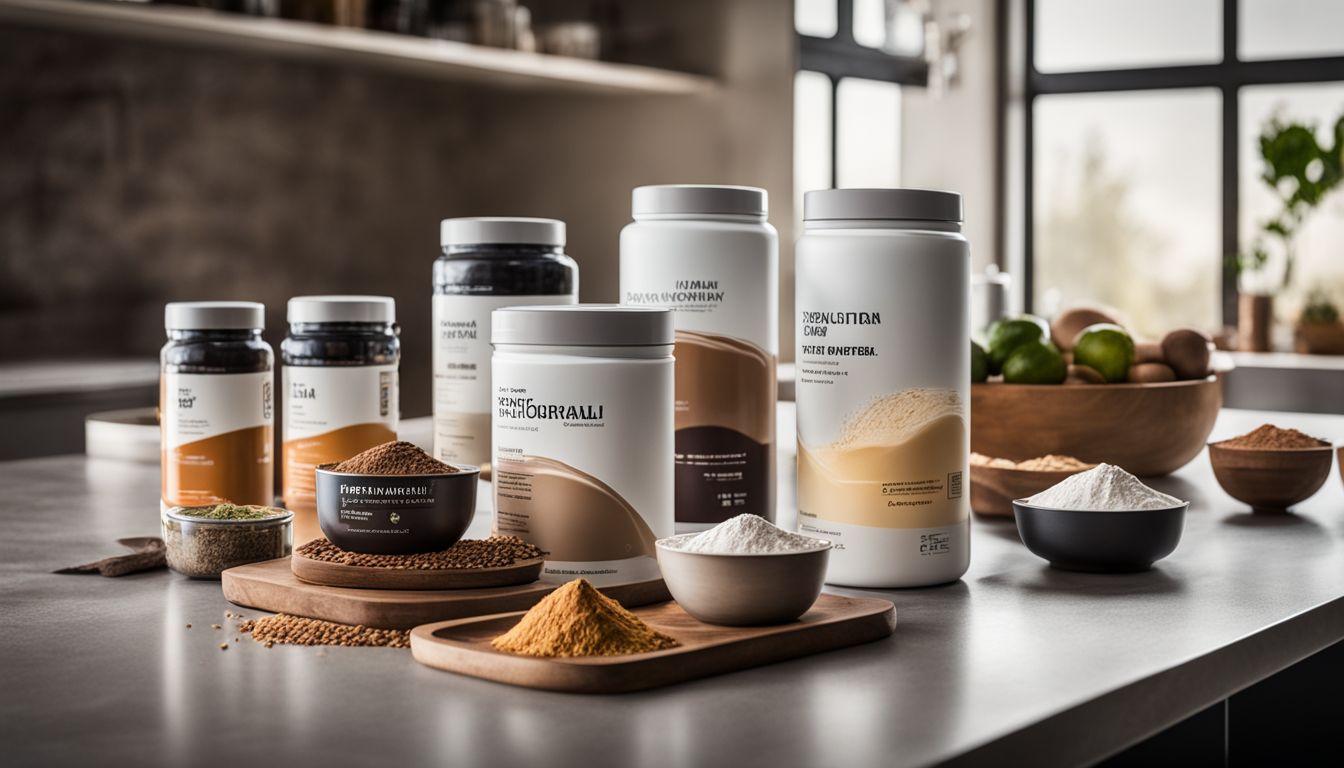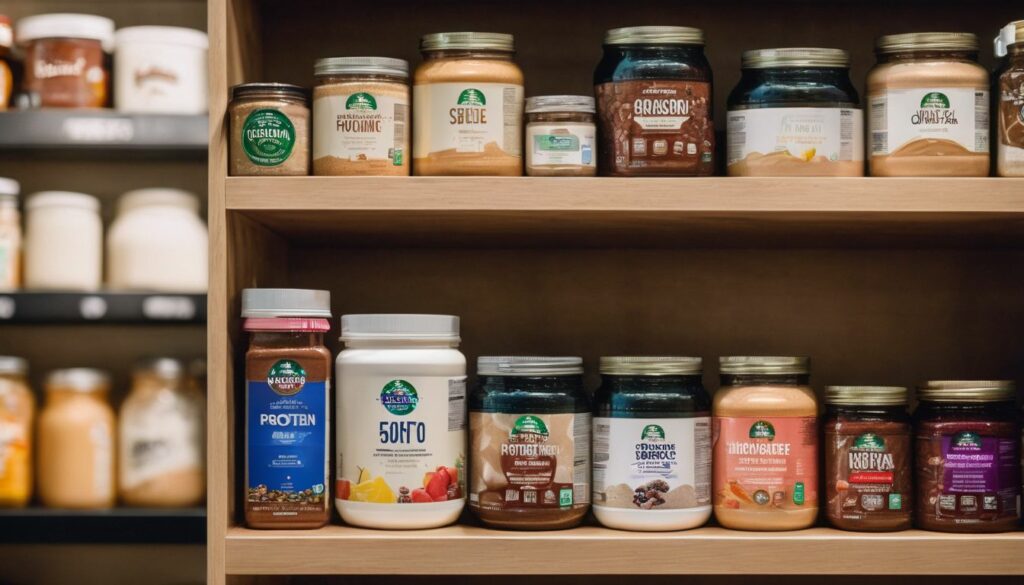- How to Choose Running Shoes for Different Terrains - January 2, 2024
- Improving Your Running Form: A Guide for Beginners - January 2, 2024
- The Science Behind Cushioning in Running Shoes - January 2, 2024
Last Updated on
Have you ever reached for your trusty protein powder only to wonder if it’s still good to use? Protein powder typically has a shelf life of 9 to 18 months, but this can vary. This blog post will dive into how you can identify if your protein powder is still safe and effective, and the best ways to store it for maximum longevity.
Keep reading to ensure your post-workout shake supports your fitness goals without a hitch!
Key Takeaways
- Protein powders have a shelf life of 9 to 18 months, with the “best-by” date as a guide to peak quality rather than an absolute expiration.
- Store protein powder in cool, dry places and always seal the container tightly after each use to prevent spoilage from air and moisture.
- Signs that your protein powder might be spoiled include unusual smells, changes in colour or texture, clumps forming due to moisture, a bitter taste, or visible mould.
- Factors affecting protein powder’s longevity include storage conditions like temperature and humidity; exposure to air which can lead to nutrient degradation; and moisture which can cause bacterial growth.
- Keeping protein powder fresh involves properly sealing containers after use, avoiding heat and moisture exposure, and checking for spoilage regularly before consumption.
Understanding Shelf Life Factors of Protein Powder

The type of protein used in a powder affects how long it will stay fresh. Whey and casein, both derived from milk, typically last longer than vegan options like pea or hemp protein.
This is due to the thorough processing methods that whey and casein undergo, which prolong their stability. Storage plays a crucial role as well; keeping your powder in a cool, dry area shields it from heat and moisture that can accelerate spoilage.
Sealed tightly in an airtight container also makes a big difference for any kind of protein powder. When sealed properly, this storage method helps prevent air from getting to the product, keeping it fresher for extended periods.
It’s vital to recognize though that even with these precautions, all powders have an expiration date to watch out for — this is the manufacturer’s guarantee of peak quality and safety until that time.
The Science Behind Protein Powder and Its Composition
Protein powders are like building blocks for your muscles, often made from whey, casein or plant-based sources like pea protein. These powders go through a process where the protein is extracted, purified, and then dried into a powder form for easy consumption.
Whey protein comes from milk and contains all nine essential amino acids necessary for muscle growth and recovery after workouts. Vegan options such as pea or hemp proteins offer alternatives to those with dairy allergies or dietary restrictions.
Understanding the composition of these supplements helps in knowing how they support your body’s nutritional needs. Casein protein, also derived from milk, digests more slowly than whey making it ideal before bedtime to provide a sustained release of amino acids overnight.
On the other hand, plant-based proteins might be fortified with additional nutrients to ensure they’re as effective as their animal-derived counterparts in supporting muscle recovery and strength training goals.
These fine-tuned formulas can include vitamins and minerals that contribute to overall health beyond just muscle maintenance.
Decoding Expiration Dates
Understanding the expiration dates of protein powder is crucial for maintaining its quality and effectiveness. The “best-by” date tells you how long the product will remain at its peak.
It’s not a hard stop but more of a guideline to let you know when the maximum benefit from your protein shake might start to decline. Keep an eye out for use-by and sell-by dates as well, which can give hints about food safety and optimal freshness.
While it may be tempting, avoid using powders that have reached their expiry date; doing so could mean ingesting degraded nutrients or risking bacterial growth. Storage conditions greatly impact a powder’s longevity, so even if the expiry date suggests it’s still good, poor handling could shorten its safe consumption window.
Always check your container for this info before whipping up that next muscle-building drink!
Factors That Affect Protein Powder Shelf Life
Numerous elements can influence the longevity of protein powder, potentially altering its efficacy and safety over time. Understanding these factors is key to maintaining the quality of your nutritional supplements and ensuring that what you consume remains beneficial for your health.
Storage conditions
Keeping your protein powder in a cool, dry place is crucial for maintaining its quality and extending its shelf life. High temperatures can cause the proteins to degrade, while humidity can lead to clumping and the growth of mould or bacteria.
A pantry or cabinet away from heat sources like stoves or ovens provides an ideal environment for storing your protein supplement.
Make sure the lid on your protein powder container is tightly sealed after each use to protect it from air and moisture. Air exposure increases the risk of oxidation, which can spoil the flavour and reduce nutritional value over time.
Consider transferring protein powder into an airtight container if you’re using large bags that don’t reseal well. This simple step helps preserve freshness and ensures you get the most out of your purchase before reaching its best-by date.
Exposure to air
Exposure to air can dramatically shorten the shelf life of protein powder. Once a container is opened, oxygen interacts with the product, starting a process that may lead to nutrient degradation and spoilage.
This exposure can cause changes in flavour, turn your protein shakes bitter, or even trigger the Maillard reaction—a chemical occurrence typically seen when foods brown during cooking—which isn’t something you’d want happening inside your supplement jar!
To prevent this unwelcome transformation, it’s critical to seal protein powder containers tightly after each use. Vacuum sealing options exist for those who take their storage seriously, but even simply making sure the lid is secure can make a big difference.
Keeping air out helps maintain freshness and ensures that your dietary supplements provide their intended nutritional benefits without the risk of foodborne illness due to decay from prolonged oxygen exposure.
Moisture
Moisture is the enemy of protein powder freshness. Even a small amount of humidity can initiate the process where your protein starts to degrade, affecting both taste and nutritional value.
If you live in a humid climate or during muggy summer months, this becomes especially problematic. Moist packages can become breeding grounds for bacteria and mould, which isn’t just unpleasant—it’s unsafe.
Keep your protein powder in an airtight container to guard against moisture seeping in. This could be as simple as sealing the original packaging well after each use or transferring the powder to a sealable plastic container or glass jar with a tight-fitting lid.
Remember that storing protein powder on top of the fridge might seem convenient but it’s risky; heat from appliances contributes to increased humidity which will compromise your powder’s longevity and effectiveness quicker than you’d think.
Signs of Spoilage or Degradation
Protein powders can go bad, and it’s important to recognize the signs of spoilage. Knowing what to look for helps ensure you consume your protein safely.
- Unusual Smell: Fresh protein powder typically has a mild, sometimes sweet scent. If your powder starts smelling sour or just “off,” it may have gone bad.
- Change in Color: Protein powders often come in a consistent colour. A change, whether it’s darkening or discolouration, indicates degradation and potential spoilage.
- Texture Alterations: Clumps or changes in the powder’s texture are red flags. They can result from exposure to moisture, leading to mould growth.
- Taste Differences: While taste can be subjective, a bitter taste is not generally associated with fresh protein. If there’s a significant alteration in taste from when you first opened it, the powder may have undergone Maillard browning—a reaction that occurs between amino acids and reducing sugars in expired foods.
- Presence of Mold: Visible mould means the protein powder is spoiled and should not be consumed. Mould can cause food poisoning and other health issues.
- Loss of Efficacy: Over time, even if not spoiled, protein powder may lose its effectiveness. If it doesn’t seem to provide the same nutritional benefits as before, this could be a sign of degradation.
How to Keep Protein Powder Fresh

Unlock the secret to longevity for your protein powder by learning optimal storage methods that ensure freshness from the first scoop to the last.
Proper storage techniques
Keep your protein powder at its best by storing it in a cool, dry place. Exposure to heat can cause the powder to degrade, so avoid cupboards near stoves or other hot appliances. Ensure that you tightly seal the container between uses; this keeps out moisture and prevents clumping.
Consider transferring your protein powder into an air-tight storage bag if it originally comes in a resealable pouch that loses its stickiness over time.
Use containers made of materials that don’t allow light or air inside easily, like thick plastic or glass with secure lids. Light can break down certain nutrients in the powder, reducing not only flavour but also nutritional value.
Don’t just rely on the original packaging—especially if it’s been opened multiple times—as this might not provide enough protection against environmental factors which could shorten your protein powder’s shelf life.
For added freshness, some people prefer keeping their sealed protein powders in the refrigerator to extend their usability even further but be sure to check if this is recommended for your specific product type as different formulations may have unique storage needs.
Common mistakes to avoid
Storing protein powder properly can make a big difference in maintaining its quality and freshness. However, some common storage mistakes could lead to your protein powder degrading faster than it should.
- Leaving the container open: Protein powder containers must be sealed tightly after each use. Exposure to air can introduce moisture and contaminants that degrade the powder’s quality.
- Ignoring storage recommendations: Always check the label for the manufacturer’s storage tips. They know best how their product maintains quality, whether it means keeping vegan protein away from heat or soy protein in a cool place.
- Stashing protein near a heat source: Heat accelerates degradation. Keep your container away from stoves, ovens, and windows where direct sunlight hits.
- Keeping it in a humid area: Moisture is an enemy of powdered products. Store your protein in a dry environment to prevent clumping and spoilage.
- Mixing old and new batches: If you add fresh powder to an older product, you might extend the older powder’s presence beyond its best-by date, potentially compromising food quality.
- Not checking for signs of spoilage: Musty smells or colour changes could signal that your milk protein has gone rancid. Make it a habit to inspect before consumption.
- Using a damp scoop: Introducing any amount of water into your powder can create an environment for bacteria to grow. Always use a dry scoop.
- Failing to fact-check storage hacks: Freezing might seem like a clever idea but always look up evidence-based research or consult experts like NSF International before trying such methods.
Potential Risks and Safety Precautions
Expired protein powder can lead to health concerns if consumed. It’s crucial to take safety precautions to minimize any potential risks.
– Check the use-by date or best-by date: Always look for these dates before using your protein powder. Consuming a product past this date increases the risk of ingesting spoiled foods, which can cause illness.
– Inspect the powder’s appearance: Before use, examine your protein powder for changes in colour or texture. Clumps may signal moisture intrusion, which can make proteins go rancid and potentially harmful.
– Smell before you scoop: If your protein powder has a strange aroma or smells off, it might have spoiled. An unusual smell is often an indicator that the product is no longer safe to consume.
– Store in a cool, dry place: Protect your protein powder from spoilage by keeping it away from heat and moisture. This helps maintain its shelf life and prevents bacterial growth associated with perishable foods.
– Seal container tightly after each use: Exposure to air can degrade the quality of your protein powder over time. Ensure you secure the lid tightly to keep air out after every scoop.
– Follow good manufacturing practices (GMP): Home storage should also adhere to standards similar to GMP by keeping utensils clean and avoiding cross-contamination with other products.
Remember that while preservatives extend shelf lives, they do not make products invincible against spoilage—always practice caution when dealing with expired food items like meat or dairy-based powders especially since they are more prone than non-perishable items to deteriorate quickly once past their prime.
If digestive upset like vomiting occurs after consuming what you suspect could be expired protein power, seek medical advice promptly as spoiled foods pose significant health risks even without visible signs of spoilage.
Lastly, stay informed about food safety guidelines issued by reputable organizations such as the Food and Drug Administration (FDA) and consumer advocacy groups like ConsumerLab.com for up-to-date information on managing various food products safely including whey proteins and other supplements common in fitness diets.
Conclusion
Protein powder is more than just a muscle-building supplement; it’s an essential part of many people’s diets. Remember, while the best-by-date gives you a timeframe, proper storage can extend its usefulness.
Keep your protein containers in cool, dry places to ward off spoilage and maintain potency. Trust your senses – if something seems off with the texture or smell, it’s better to play it safe.
Knowing how to handle your protein powder guarantees that every shake supports your wellness goals effectively.

